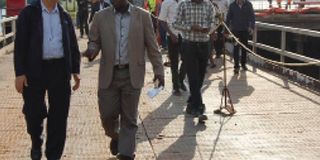Building materials scarcity delays Jinja bridge works

The Thailand Ambassador to Uganda and Kenya, Mr Prasittiporn Wetprasit (Left), is shown around the new bridge in Jinja by the head of bridges at the Uganda National Road Authority, Mr Lawrence Pariyo, during the ambassador’s visit to the construction site last Saturday. Photo by Denis Edema
What you need to know:
- At the moment, progress is at 40 per cent and there are efforts to speed up the work so that the deadline can be met.
- According to Mr Pario, about 90 per cent of people employed in the project are Ugandans.
Jinja. Scarcity of building materials, time spent waiting for the arrival of procured products and the labourious processes involved in importing construction items, is set to delay the completion of the mega Nile Bridge project, Daily Monitor has learnt.
The $125 million (about Shs423 billion) New Nile Bridge, is currently being constructed at the source of the River Nile in Jinja District.
If completed, it will supplement the Nalubaale Bridge, which was built more than six decades ago.
Speaking to journalists at the construction site last week, the resident engineer, Mr Jackson Mwakali, said most of the required materials such as iron bars and cables are imported and until their arrival, there is usually a break.
“We have to make orders for the types, quality and sizes of the materials we need. Then they are manufactured and sent here (in Uganda). The other challenge is scarcity of material like the lake sand,” Mr Mwakali said.
“The biggest challenges, however, are processes and the time involved in getting the materials we need for building the bridge. From the point an order is made, to the time the assortment (materials) are delivered at the building site in Jinja takes time,” he added.
This means that unless this problem is fixed, the project launched by President Museveni about three years ago, could be completed beyond its 2018 agreed timeline.
However, the Uganda National Roads Authority (Unra) senior manager for bridges and structures, Mr Lawrence Pario, said everything was being done to ensure the project beats the February 2018 deadline.
At the moment, progress is at 40 per cent and there are efforts to speed up the work so that the deadline can be met.
The government funds 20 per cent of the total budget (about Shs85 billion) and Japan takes the rest in form of a soft loan of $100 million (Shs338b) at an annual interest rate of 0.01 per cent, repayable in 10 years but extendable to 40 years.
The roads authority awarded the deal to a Japanese company Zenitaka Corporation in November 2013.
According to Mr Pario, about 90 per cent of people employed in the project are Ugandans.
He said many of them are also being skilled, an expertise that could come in handy even after the project ends. When completed, it will also enhance trade between Uganda and the region as well as promote tourism and pave way for smooth traffic flow.




